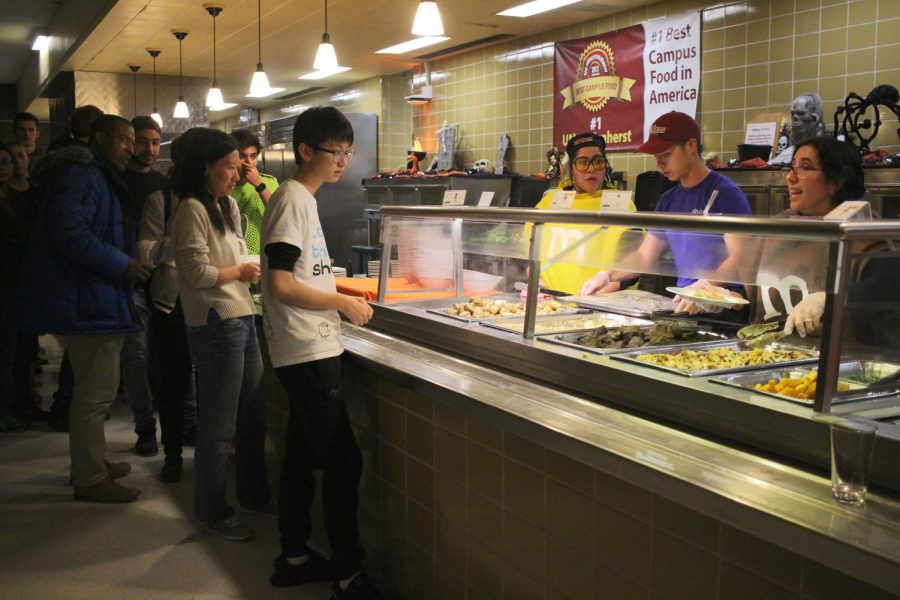How much could go wrong at the highest-ranked campus dining service in the country? Ask any student and they’ll tell you.
In just one semester, controversies have enveloped the University of Massachusetts’ dining program over Late Night, hour changes and compostable cups. It is a recurring spectacle: UMass Dining announces a major change, it faces intense uproar, and it then reverts or compromises on the new policy. The debate of whether the dining halls should cut compostable take-out cups from their shelves, for example, ended when the decision was revoked less than a week after it began.
Like a student protecting their 4.0 GPA, UMass Dining needs to do everything to keep its standing as the nation’s best campus food. But is it worth it? As the price of maintaining these quality services becomes paramount and the program is hamstrung by its need to satisfy students’ demands, UMass Dining is unable to make decisions for the better or worse. Since the Princeton Review relies on surveys to discover the nation’s top dining establishment, hot-button issues are prioritized over day-to-day needs—and that may well be UMass Dining’s downfall.
The dining survey, held biannually, carries a lot of weight for the people in charge. “They’re the ones giving us our grade,” said Christopher Howland of UMass Auxiliary Enterprises in one Massachusetts Daily Collegian article. At the end of the day, the survey is all that matters. The Princeton Review’s website says the ranking is “entirely the result of what its own students surveyed by The Princeton Review reported about their campus experiences.”
So student’s reactions to those hot-button crises like the removal of compostable to-go cups matter. Even though the question of whether they belong in dining halls is a reasonable debate, the outcry was so intense on social media and on the ground that they had to cave. In essence, any decision made by UMass Dining needs to go through the students; otherwise, they must reckon with what will be on students’ minds while they take the survey.
Amid these dilemmas, the decline of the day-to-day experience at UMass Dining is left unaddressed. My impression of dining hall service this semester has been that staff are struggling to keep food and beverages stocked; at Franklin Dining Hall, I have been in situations where over half of the offered drinks were empty. Food in high demand comes off the tray quickly and can take several minutes to be returned, more so than previous years. I’m not alone: in a recent Massachusetts Daily Collegian documentary, students described their struggles with undercooked food and declining quality of service.
That’s speaking for those of us with the privilege of enjoying the food in the first place. The voices of those who cannot eat here are not represented in The Princeton Review’s surveys; yet food insecurity, the single most disconcerting problem regarding UMass Dining, persists. How can UMass Dining make these services more affordable without risking its pristine reputation? They can’t cut anything substantial without pushback, nor can they depend on higher enrollment to benefit them until their capacity increases, which won’t happen until the new Worcester Dining Commons opensin 2020. Under pressure to meet top-tier standards, we can only expect the dining program to raise its price.
To be clear, these uproars aren’t cases of the campus “mob” or the overreaching power of social media—students are entitled to their opinions on each decision the program makes. As a point of fact, I’ve disagreed with all of their controversial decisions on a case-by-case basis. UMass Dining’s attempt to reform Late Night services would have been a hit to campus culture and the reduction of hours of Franklin and Hampshire Dining Commons has made the halls less accessible to students on later schedules like myself. As for the cups? With respect to sustainability, where we buy our food matters more than our cups.
The program should have some agency over how far it goes to woo students, though. At the end of the day, I’m only looking for good food and a decent eating experience. I wouldn’t mind Franklin cutting service past 9 p.m. if the service during the day was satisfactory. I wouldn’t be as frustrated with the price of dining if enough employees were present and given the hours they need to feel included in the community. I wouldn’t mind losing compostable cups if I felt like the overall dining experience was improving rather than declining.
All parties face a challenge in this dilemma. UMass dining is trying to balance their needs, and students are trying to eat. Frankly, the pressure of winning over The Princeton Review turns our eating experience into a public relations operation, not an essential service. We should save ourselves from an upset next year, step out of the competition altogether and focus on what’s important: accessibility, affordability and consistency of service. With that, we’ll be known for a lot more than what The Princeton Review thinks of us.
James Mazarakis is a Collegian columnist and can be reached at [email protected].




















Stephanie Higgins • May 3, 2019 at 10:26 am
Just catching this! Wholeheartedly agree. Thanks for writing this.